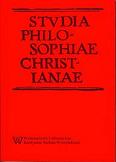The splendor of truth and intrinsically immoral acts I: A philosophical defense of the rejection of proportionalism and consequentialism in "Veritatis Splendor"
The splendor of truth and intrinsically immoral acts I: A philosophical defense of the rejection of proportionalism and consequentialism in "Veritatis Splendor"
Author(s): Josef SeifertSubject(s): Philosophy, Ethics / Practical Philosophy
Published by: Wydawnictwo Naukowe Uniwersytetu Kardynała Stefana Wyszyńskiego w Warszawie
Keywords: intrinsically evil acts; consequentialist ethics; teleological ethics; moral absolutes
Summary/Abstract: The present article is the first part of a paper that was delivered, in an abbreviated form, as keynote address, December 16, at the Conference “Ethics of Moral Absolutes Twenty years after 'Veritatis Splendor', Warsaw 16th–17th December 2013. Containing the word truth in its name, the Encyclical insists that human freedom is based on the foundation of truth. Therefore, even though the judgment of conscience represents the highest subjective norm for moral actions, our first obligation is that our conscience itself conform to the truth and base itself on its knowledge. Even in the case in which an erring conscience obliges or frees us to commit what we deem to be good or permitted, this is only true in virtue of the sincerity and authenticity of a person searching the truth as foundation of the voice of conscience. In other words, conscience receives its extraordinary ultimate subjective moral authority only – even if it is based on error – from the truth which it always must intend as ground of its verdict. In the following, I will try to show by purely philosophical reflections that these fundamental tenets of "Veritatis Splendor" are not merely based on the Holy Scripture and Church teaching, but can also be shown to be true by philosophical reason.
Journal: Studia Philosophiae Christianae
- Issue Year: 51/2015
- Issue No: 2
- Page Range: 27-67
- Page Count: 41
- Language: English

